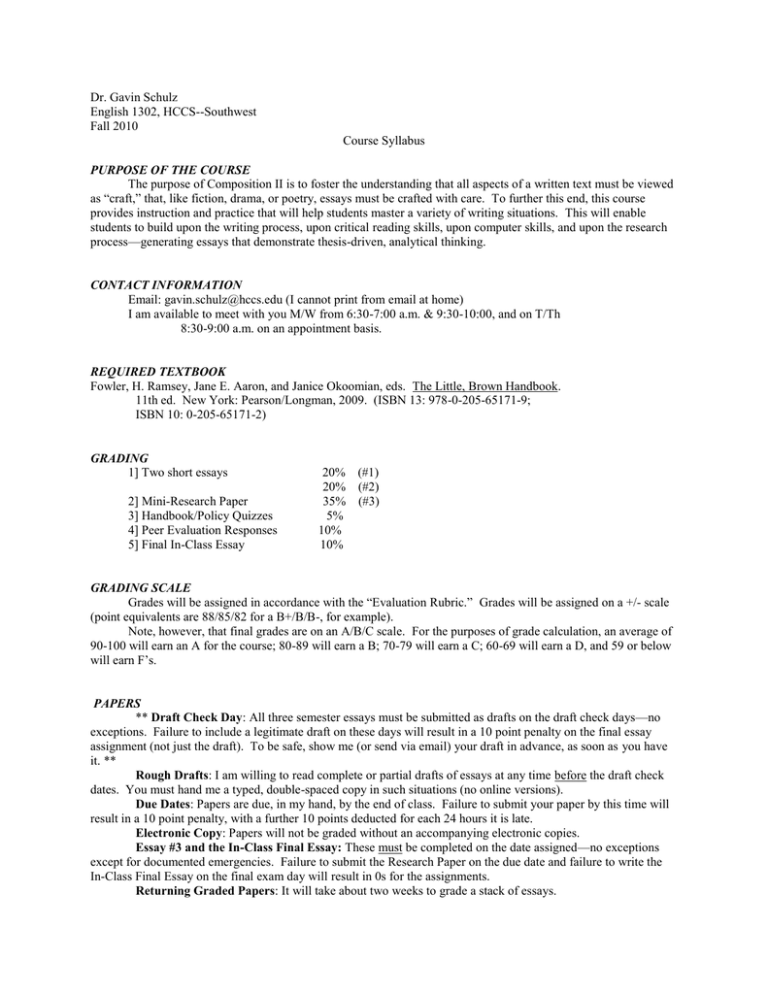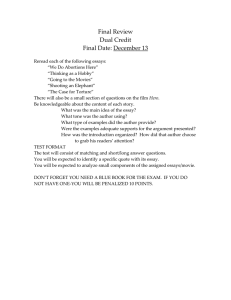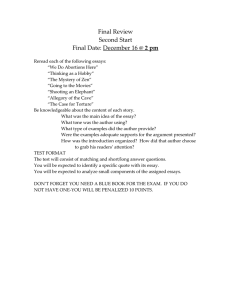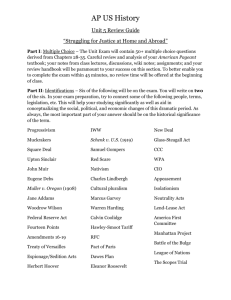
Dr. Gavin Schulz
English 1302, HCCS--Southwest
Fall 2010
Course Syllabus
PURPOSE OF THE COURSE
The purpose of Composition II is to foster the understanding that all aspects of a written text must be viewed
as “craft,” that, like fiction, drama, or poetry, essays must be crafted with care. To further this end, this course
provides instruction and practice that will help students master a variety of writing situations. This will enable
students to build upon the writing process, upon critical reading skills, upon computer skills, and upon the research
process—generating essays that demonstrate thesis-driven, analytical thinking.
CONTACT INFORMATION
Email: gavin.schulz@hccs.edu (I cannot print from email at home)
I am available to meet with you M/W from 6:30-7:00 a.m. & 9:30-10:00, and on T/Th
8:30-9:00 a.m. on an appointment basis.
REQUIRED TEXTBOOK
Fowler, H. Ramsey, Jane E. Aaron, and Janice Okoomian, eds. The Little, Brown Handbook.
11th ed. New York: Pearson/Longman, 2009. (ISBN 13: 978-0-205-65171-9;
ISBN 10: 0-205-65171-2)
GRADING
1] Two short essays
2] Mini-Research Paper
3] Handbook/Policy Quizzes
4] Peer Evaluation Responses
5] Final In-Class Essay
20% (#1)
20% (#2)
35% (#3)
5%
10%
10%
GRADING SCALE
Grades will be assigned in accordance with the “Evaluation Rubric.” Grades will be assigned on a +/- scale
(point equivalents are 88/85/82 for a B+/B/B-, for example).
Note, however, that final grades are on an A/B/C scale. For the purposes of grade calculation, an average of
90-100 will earn an A for the course; 80-89 will earn a B; 70-79 will earn a C; 60-69 will earn a D, and 59 or below
will earn F’s.
PAPERS
** Draft Check Day: All three semester essays must be submitted as drafts on the draft check days—no
exceptions. Failure to include a legitimate draft on these days will result in a 10 point penalty on the final essay
assignment (not just the draft). To be safe, show me (or send via email) your draft in advance, as soon as you have
it. **
Rough Drafts: I am willing to read complete or partial drafts of essays at any time before the draft check
dates. You must hand me a typed, double-spaced copy in such situations (no online versions).
Due Dates: Papers are due, in my hand, by the end of class. Failure to submit your paper by this time will
result in a 10 point penalty, with a further 10 points deducted for each 24 hours it is late.
Electronic Copy: Papers will not be graded without an accompanying electronic copies.
Essay #3 and the In-Class Final Essay: These must be completed on the date assigned—no exceptions
except for documented emergencies. Failure to submit the Research Paper on the due date and failure to write the
In-Class Final Essay on the final exam day will result in 0s for the assignments.
Returning Graded Papers: It will take about two weeks to grade a stack of essays.
Grading Late Papers: All essays turned in (both hard and electronic copies) after class on the due dates,
for whatever reason, will be placed in a separate pile and will be graded only after all of the on-time essays have
been completed.
Lost Papers: Please keep a copy of your papers for your own file; should a paper be lost, it is your
responsibility to give me another.
EXCUSES
Broken computers, printers out of ink, car running out of gas, etc. These may be reasons why you cannot
turn in your paper on time, but they are not excuses. If you wait until the last minute to turn something in and fate
conspires against you, then you have only yourself to blame. Always keep a backup copy of your essay, and always
submit your essay by email as soon as it’s ready.
EXTRA CREDIT
There is none. Your grade in this class will be determined by how well you do on the assignments
themselves.
ESSAY REQUIREMENTS
Essays that have failed to fulfill the assignment’s requirements will not be accepted. They will be
considered late.
GRAMMAR
Essays that do not meet the minimum grammatical requirements for college level writing in this class will be
penalized; these essays will earn an average of two grades: the grade for the essay and an F (50 points) for grammar.
ATTENDANCE AND WITHDRAWAL POLICY
Absences: Attendance is required by the State of Texas and HCCS at all class meetings. The State of Texas
now requires that all students who miss the first two days of class to be withdrawn. **Furthermore, should you miss
more than 6 hours of class in a semester, the State of Texas now requires that you be given an “FX”—a failure for
reasons of attendance.
Tardiness: Note, however, that showing up twenty minutes late to class each day does not mean that you
have perfect attendance; it means that you have missed one-fifth of the semester (about 7 hours of class). Therefore,
tardiness of more than 20 minutes will be recorded as an absence.
Withdrawal: It is the student’s responsibility to withdraw; so, should you decide to drop the class, do not
merely stop coming. Note that we no longer have the option to assign "W"'s at the end of the semester, so all
students still on my roll at the end of the semester will receive grades.
Missed Schoolwork: You are, in any event, responsible for any material assigned or collected on those
days that you are absent or tardy. Be sure to get the notes from somebody who was in class. If a paper is due on a
day that you are going to be absent, it is your responsibility to find a way to turn it in. Missed exercises/quizzes may
not be made up.
* TEXAS WITHDRAWAL RULE *
Students who repeat a course three or more times, or who accumulate 6 or more “W”’s during their college
career, face significant tuition/fee increases at HCC and other Texas public colleges and universities. If you are
considering course withdrawal, confer with your instructor/counselor as early as possible about your study habits,
reading and writing homework, attendance, course participation, and opportunities for tutoring that might be
available.
INTERNATIONAL STUDENTS
Receiving a “W” in a course may affect the status of your student visa. Once a “W” is given for the course,
it will not be changed to an “F” because of the visa consideration. Please contact the International Student Office at
713-718-8520 if you have any questions about your visa status and any other transfer issues.
BOOKSTORE
Please note that the bookstore is not run by HCC. It is a Barnes and Noble facility. We, therefore, have no
say in how it is run, what books they stock, how many copies of each book they stock, or what they claim you will
need for any specific class.
ELECTRONIC DEVICES
Use of recording devices, including camera phones and tape recorders, is prohibited in classrooms and other
locations where instruction, tutoring, or testing occurs. Inappropriate use of a recording device will be reported to
the police and may be a felony offense.
NEW STUDENT SURVEY SYSTEM
At Houston Community College, professors believe that thoughtful student feedback is necessary to
improve teaching and learning. During a designated time, you will be asked to answer a short online survey of
research-based questions related to instruction. The anonymous results of the survey will be made available to your
professors and division chairs for continual improvement of instruction. Look for the survey as part of the Houston
Community College Student System online near the end of the term.
SPECIAL CONDITIONS/CIRCUMSTANCES
Any student with a documented disability (e.g. physical, learning, psychological, vision, hearing, etc.) who
needs to arrange reasonable accommodations must contact the Disability Services Office at the beginning of each
semester.
INCLEMENT WEATHER
During inclement weather conditions, monitor major local channels for updates on school closings. You can also
check for school closing information on the HCC homepage.
POLICY ON ACADEMIC DISHONESTY
Scholastic Dishonesty includes, but is not limited to:
1] “Plagiarism”--the appropriation of previously written work and the unacknowledged incorporation of that
work in one’s own written work for credit.
2] “Collusion”--the unauthorized collaboration with another person in preparing written work for credit.
A student guilty of a first offense will earn a grade of 0 on the assignment involved. For a second offense,
the student will earn an F for the course.
ENGLISH 13O2 COURSE DESCRIPTION
English 1302 is a more extensive study of the skills introduced in English 1301 with an emphasis on critical
thinking, research and documentation techniques, and literary and rhetorical analysis. English 1302 is a core
curriculum course.
BASIC INTELLECTUAL COMPETENCIES IN HCCS CORE
· READING: Reading material at the college level means having the ability to analyze and interpret a variety of
materials -- books, articles, and documents.
· WRITING: Writing at the college level means having the ability to produce clear, correct, and coherent prose
·
·
·
·
adapted to purpose, occasion, and audience. In addition to knowing correct grammar, spelling, and punctuation,
students should also become familiar with the writing process, including how to discover a topic, how to
develop and organize it, and how to phrase it effectively for their audience. These abilities are acquired through
practice and reflection.
SPEAKING: Effective speaking is the ability to communicate orally in clear, coherent, and persuasive
language appropriate to purpose, occasion, and audience.
LISTENING: Listening at the college level means the ability to analyze and interpret various forms of spoken
communication.
CRITICAL THINKING: Critical thinking embraces methods of applying both qualitative and quantitative
skills analytically and creatively to subject matter in order to evaluate arguments and to construct alternative
strategies. Problem solving is one of the applications of critical thinking used to address an identified task.
COMPUTER LITERACY: Computer literacy at the college level means having the ability to use computerbased technology in communicating, solving problems, and acquiring information. Core-educated students
should have an understanding of the limits, problems, and possibilities associated with the use of technology
and should have the tools necessary to evaluate and learn new technologies as they become available.
EXEMPLARY EDUCATIONAL OBJECTIVES: ENGLISH 1302
By the time they have completed English 1302, students will
• demonstrate the ability to use consistently and effectively the writing process for both in-class and out-of-class
essays (thus reinforcing English 1301 instruction);
• understand and apply the basic principles of critical thinking—evaluation, analysis, and synthesis— as they write
essays that persuade or argue;
• be able to analyze, in writing, readings by professional and student writers (for such elements as purpose,
audience tone, style, writing strategy, and for much deeper meanings);
• be able to develop a critical and creative essay in response to an issue related to reading(s) or other class projects;
• demonstrate the ability to resist simplistic formulations, whether in their own or others’ texts;
• understand the characteristics of imaginative texts and write effective analyses of various genres;
• be able to acknowledge, as appropriate, their own history, interests, and biases as they discuss a topic, thus placing
themselves credibly in the discussion;
• develop the ability to research and write a documented paper;
• make effective stylistic choices (diction, tone, sentence structure) in all writing assignments, depending upon the
audience and purpose of a piece of writing;
• apply suggestions, as appropriate, from evaluated compositions to other writing tasks; and
• fulfill the writing requirements of the course, writing at least 6000 words during the semester.
STUDENT LEARNING OUTCOMES
1] Apply basic principles of rhetorical analysis.
2] Write essays that classify, explain, and evaluate rhetorical and literary strategies employed in argument,
persuasion, and various forms of literature.
3] Identify, differentiate, integrate, and synthesize research materials into argumentative and/or analytical
essays.
4] Employ appropriate documentation style and format across the spectrum of in-class and out-of-class
written discourse.
5] Demonstrate library literacy.
(** Note: changes can and may be made at the Instructor’s discretion **)
Dr. Gavin Schulz
English 1302, HCCS--Southwest
Fall 2011
Class Assignments/Reading Schedule
(* Assignments are to be completed for the class they are listed under *)
(* Please bring both books to class each day)
Week 1:
Aug. 29] Course Introduction
31] Diagnostic Essay
Week 2:
5] LABOR DAY HOLIDAY !!!
7] Sample Diagnostic Essay
Week 3:
12] Introduction to Essay #1 / Citing Anthologies in APA /
Handbook Quiz #1 (bring Handbook!)
14] Analysis of Articles / Thesis Statements
Read for class: Online editorials from the Sep. 7-9th editions of the New York Times, at
http://www.nytimes.com/pages/opinion/global/index.html (found in the “Opinion”
section). There should be about 4-5 articles at left side of page under headings
“Editorials.”
Week 4:
19] Introductions / Plagiarism / Handbook Quiz #2 (bring Handbook!)
21] Analysis Paragraph Structure / Handbook Quiz #3 (bring Handbook!)
Week 5:
26] Opposition/Response Paragraphs
28] ** Draft Check Day **
Peer Evaluation of Rough Draft Essay #1
Bring: 2 copies of rough draft (as specified in the Essay #1
assignment sheet)
Week 6:
Oct.
3] ** Final Draft of Essay #1 Due / Handbook Quiz #4 (bring Handbook!)
Turn in to me: Final draft, any research xeroxes, any peer
evaluation responses, and an electronic copy of your essay
5] Introduction to Essay #2 / Citing web pages in Chicago format /
Handbook Quiz #5 (bring Handbook!)
Week 7:
10] Defining Character Traits / Brainstorming Ideas
Read for class: Online stories listed on my Learning Web page
12] Cause & Effect Argumentation / Transitions / Conclusions /
Handbook Quiz #6 (bring Handbook!)
Week 8:
17] Conference Day / Handbook Quiz #7 (bring Handbook!)
Bring: working draft of your essay
19] ** Draft Check Day **
Peer Evaluation of Rough Draft Essay #2
Bring: 2 copies of rough draft (as specified in the Essay #2
assignment sheet)
Week 9:
24] ** Final Draft of Essay #2 Due
Turn in to me: Final draft, all research xeroxes, any peer evaluation responses,
and an electronic copy of your essay
26] Introduction to Essay #3 / Titles / Handbook Quiz #8 (bring Handbook!)
Week 10:
31] Argumentation / Handbook Quiz #9 (bring Handbook!)
Read for class: The articles on the homepage of The International Herald Tribune (Oct. 29-30
editions) found at www.iht.com--choose an article you would like to argue about.
Nov.
2] Opposition & Response Paragraphs
** Thurs. Nov. 3: Last day to drop with a "W" **
Week 11:
7] Library & Research Introduction / Legitimate Sources
** Class Meets In: Library Computer Lab
9] Database Research / Handbook Quiz #10 (bring Handbook!)
Week 12:
14] Incorporating Sources
Bring: One book or one magazine/journal article or one
Internet source or one database article
(preferably one you might use as research,
though it can be any book/magazine/journal)
16] In-Text Citations / Handbook Quiz #11 (bring Handbook!)
Bring: One book & one database article,
Week 13:
21] Works Cited Citations (Part I)
Bring: One book and one Internet article
23] Conference/Research Day
Week 14:
28] ** Draft Check Day **
Works Cited Citations (Part II)
Bring: One magazine & database article
30] Conference/Research Day / Handbook Quiz #12 (bring Handbook!)
Week 15:
Dec.
5] ** Final Draft of Research Paper Due ** / Introduction to In-Class Final Essay
Turn in to me: Final draft, all xeroxes of source material, and
an electronic copy of your essay
7] Final Preparation Day
*
*
*
*
*
Final Exam Date (In-Class Essay): Monday, Dec. 12 from 9:00 a.m.-10:50 p.m.
in our regular classrooms.
(** Note: changes can and may be made at the Instructor’s discretion **)




